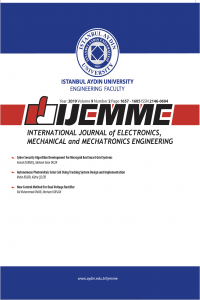Association Rule Mining to Extract Knowledge from Online Store Transactions of a Turkish Retail Company: A Case Study
Association Rule Mining to Extract Knowledge from Online Store Transactions of a Turkish Retail Company: A Case Study
Association analysis, Apriori Analysis, Data Mining,
___
- Timor M. ,EZERCE A. , GURSOY
- U. T., “Müşteri Profili ve Alişveriş Davranışlarını Belirlemede Kümeleme ve Birliktelik Kuralları Analizi: Perakende sektöründe bir uygulama” , İstanbul Üniversitesi İşletme Fakültesi İşletme İktisadı Enstitüsü Dergisi, February 2011 22 68
- R. Agrawal, R. Srikant, Fast algorithms for
- mining association rules, in: Proceedings of the 20th International Conference on Very Large Data Bases, 1994, pp. 487–499
- J. Singh, H. Ram, Dr. J.S. Sodhi, Improving
- Efficiency of Apriori Algorithm Using Transaction Reduction International Journal of Scientific and Research Publications, Volume 3, Issue 1, January 2013
- Cheng-Hsiung Weng, Mining fuzzy
- specific rare itemsets for education data, Knowledge-Based Systems, Volume 24, Issue 5, July 2011, Pages 697-708, ISSN 0950-7051, http://dx.doi.org/10.1016/j. knosys.2011.02.010.
- R. Agrawal, T. Imielinski, A. Swami,
- Mining association rules between sets of items in large databases, in: Proceedings of ACM SIGMOD, 1993, pp. 207–216.
- Y.L. Chen, C.H. Weng, Mining association
- rules from imprecise ordinal data, Fuzzy Sets and Systems 159 (4) (2008) 460–474.
- Y.L. Chen, C.H. Weng, Mining fuzzy
- association rules from questionnaire data, Knowledge-Based Systems 22 (1) (2009) 46–56.
- M. Delgado, N. Marin, D. Sanchez, M.A.
- Vila, Fuzzy association rules: general model and applications, IEEE Transactions on Fuzzy Systems 11 (2) (2003) 214–225
- S. S. Weng, S. C. Liu, T. H. Wu, Applying
- bayesian network and association rule analysis for product recommendation, International Journal of Electronic Business Management 2011
- Moon, T.K., “The expectation
- maximization algorithm,” Signal Processing Magazine, IEEE , vol.13, no.6, pp.47,60, Nov 1996 doi: 10.1109/79.543975
- G. Gürgen, “Birliktelik kuralları ve sepet
- analizi uygulaması”, yüksek lisans tezi, Marmara Universitesi, istatistik Anabilim dalı
- T. SERVİ, “Çok Değişkenli Karma
- Dağilim Modeline Dayali Kümeleme Analizi”, Çukurova Üniversitesi Fen Bilimleri Enstitüsü, PhD. Thesis, 2009
- ISSN: 2146-0604
- Başlangıç: 2011
- Yayıncı: İstanbul Aydın Üniversitesi
Importance Of Public Relations In Natural Stone Mining And Its Contribution To The Industry
Behzat Gökçen DEMİR, Deniz İskender ÖNENÇ, Nusret GÜNGÖR, Akın AKBULUT
Experimental Analysis Of Thermoplastic Cooler In Led Lighting Systems
Temel Sönmezocak, Osman Nuri Uçan, Reşit ERÇETİN
Determination of Losses In Urban Transformation Example of Sulukule
Elif Şafak Sivri, Mustafa Cem KASAPBAŞI, Fettullah Karabiber
